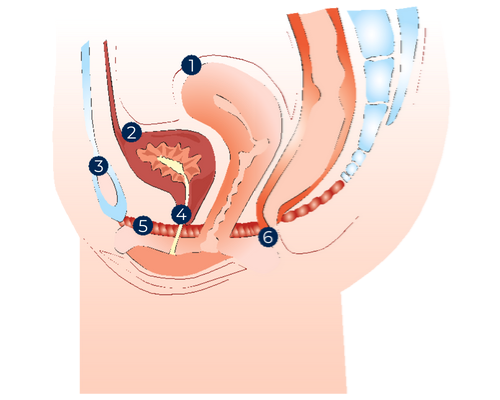It is estimated that 2-3 times as many women as men live with urinary incontinence. Women are, among other things, more predisposed to bladder leaks due to pregnancy, childbirth, and menopause. Learn more in this article.
Incontinence – More Common Than You Think
When affected, it can feel like you are the only person in the world who lives with urinary incontinence. This can be an isolating feeling and discourage you from speaking openly about it, seeking help, and living the active life you want. However, if you live with urinary incontinence, knowing you are not alone is important. Around 1 in 4 women live with incontinence, and the prevalence highly increases with age (5).
Urinary incontinence is not life-threatening, but the symptoms may seriously influence your physical, psychological, and social well-being (2). Research shows that women with incontinence have lower self-esteem, a less active sex life, and a higher prevalence of depression than women with healthy bladders.
In this article, you can learn more about urinary incontinence in women, why you have it, and what you can do about it. Living with incontinence does not have to become an issue, and living an active and social life is still possible.
Why Women Are Prone to Incontinence
Incontinence is much more common in women than in men. The reason why women are prone to incontinence is found in pregnancy, childbirth, and menopause.
The effects of childbirth can be weakened musculature and connective tissue causing poor control of the pelvic floor and urinary tracts. However, female estrogen levels can also influence the elasticity of the pelvic floor. For instance, when hormone production decreases during menopause, the tissue becomes looser.
Many women have been told their entire lives that upholding a strong pelvic floor is essential, but many might not know why this is so important.
Doing pelvic floor exercises is particularly important, as the pelvic floor supports the abdominal organs, the bladder, the uterus, and the intestines. It also significantly influences the closing function of the vagina, rectum, and urinary tract. Therefore, a weak pelvic floor can cause you to develop incontinence and loss of bladder control.
However, in the case of sudden onset of incontinence, suspect that a urinary tract infection or constipation could be the cause, not a weak pelvic floor.
It is important to note that underlying neurological disorders, underlying medical conditions, and physical problems can also cause incontinence. You should always consult a healthcare practitioner if you are experiencing incontinence.
Let’s dive deeper into some causes of urinary incontinence in women below.
Incontinence During and After Pregnancy
More than one-third of women experience urinary incontinence during pregnancy (3). As the baby grows, the uterus pushes down on the bladder, urethra, and pelvic floor muscles, making it harder to control the bladder.
The pregnancy hormone, hCG, also causes an increase in the body's blood supply, making the blood supply to the kidneys faster than normal. The result is that the bladder fills up faster, and pregnant women need to go to the toilet more often than usual.
Further, during pregnancy, the hormone progesterone also works to loosen the woman’s ligaments to prepare it for childbirth. This also weakens the pelvic floor making it harder to hold back urine.
Most problems with bladder control during pregnancy go away within 1 year after childbirth (4) once the muscles have had some time to heal.
Menopause and Incontinence
Some women start experiencing urinary incontinence when they reach menopause. With decreasing estrogen levels, the mucous membrane and tissue in the urethra can become less elastic. This means that the urethra does not close off to the bladder as effectively as previously. This can cause urine leaks to appear.
The decreasing estrogen level also affects your abdominal muscles and can cause your bladder to move around and cause urinary leakages.
In addition, the pelvic floor muscles supporting the bladder may weaken with time. When the muscles that support the urinary tract are weakened, the muscles in the urinary tract work harder to hold back urine. The extra stress or pressure on the bladder and urethra can cause poor bladder control.
Bladder Prolapse and Leakages
Another reason for urinary incontinence in women is a prolapsed bladder and/or uterus, also known as a cystocele. Weak muscles and ligaments cause bladder prolapse, and the condition increases with age.
When the bladder drops from its normal position in the pelvis and pushes on the wall of the vagina. This frequently causes stress incontinence but can also result in urge and mixed incontinence.
If you suspect having a prolapsed bladder, seeking advice from a healthcare professional is important.
Excess Weight or Obesity
Maintaining a healthy weight and staying active are essential factors in relation to having control over the bladder and bowel.
Being overweight can primarily lead to stress incontinence, as extra weight around the stomach can cause pressure on the bladder, making it even more challenging to avoid leakages.
Neurological Conditions
Several neurological conditions can cause incontinence. For healthy adults, the urinary bladder can hold around ½ liter, but humans often feel the urge to urinate when there is 250-300 ml of urine in the bladder.
The urge to urinate can normally be suppressed until it is socially acceptable to pass the urine. This means that we usually receive a 'warning' in good time before we need to go.
To suppress the urge to urinate, we need normal control mechanisms in the brain and the nerves in the spinal cord that signal whether it is ok to ‘go.’ Disturbances to the nervous system can also mean that you cannot feel your bladder is full, causing overflow incontinence.
Disorders that may disturb the nervous signals can result in loss of control of the bladder or the ability to empty it completely:
- Brain injury
- Multiple Sclerosis
- Stroke
- Diabetes
- Parkinson's Disease
- Alzheimer’s Disease
- Spinal cord injury
The Most Common Types of Incontinence in Women
The two most common types of incontinence in women are stress incontinence and urge incontinence. However, many women experience both types of incontinence simultaneously. When this occurs, it is referred to as mixed incontinence. In these cases, treatment will be based on the symptoms that burden you the most in your everyday life.
Female Stress Incontinence
Stress incontinence is the most common type of incontinence in both men and women. It occurs when the bladder leaks urine during activities that put it under pressure (stress), such as running, lifting, jumping, coughing, laughing, sneezing, etc.
Stress incontinence is also a result of the weakening of the pelvic floor muscles and the urethral sphincter, which are used to hold back urine.
Female Urge Incontinence
The second most common type of incontinence is urge incontinence. Women with urge incontinence feel an intense and sudden urge to urinate. The urge is so strong that it is impossible to hold back the urine. Urge incontinence is often called an overactive bladder and is caused by involuntary bladder contractions.
The urge to urinate is felt frequently throughout the day. As a result, people with urge incontinence often go to the toilet more often than necessary, making the bladder even weaker. Others avoid drinking liquids, even though hydration is vital in maintaining a healthy bladder.
Temporary Incontinence in Women
Many women also experience incontinence in shorter periods of time during their lifetime. This can have many different causes.
One of the most common causes of temporary incontinence is urinary tract infections (UTIs). Women are more often exposed to urinary tract infections than men because of a short urethra where bacteria can easily travel to the bladder and cause UTIs. The infection can cause swelling and irritation of the bladder and, thereby, cause bladder leakages. When the UTI is treated, your incontinence will go away as well.
Other causes of temporary incontinence include constipation, drinking too much (or drinking too little), as well as certain types of medications, muscle relaxants, sedatives, and more.
How to Prevent Bladder Leakages
You cannot always prevent or relieve urinary incontinence on your own. However, if you are among the thousands of people who have hopped on the trend of drinking lemon water first thing in the morning, you might not be doing yourself any favours.
Acidic foods like lemons are considered bladder irritants and can worsen urinary incontinence. Other bladder irritants include caffeine, alcohol, spicy foods, and sugary foods.
Here are some more useful tips that are worth a shot if you are experiencing loss of bladder control:
- Maintain a healthy body weight
- Practice pelvic floor exercises (find our pelvic floor exercise guide here)
- Avoid bladder irritants such as caffeine, alcohol, and acidic foods
- Eat fibre-rich foods to avoid constipation
- Don’t smoke – or stop smoking if you are (your general practitioner can help)
- If you are diabetic, make sure your diabetes is well-regulated
- Stay hydrated (don’t try to limit fluid intake to prevent leaks – this will irritate your bladder)
- Avoid UTIs by changing your pad every time you go to the toilet or whenever it is wet
Seek Professional Help
Urinary incontinence is not a disease but a symptom that something is wrong. The good news is that most types of urinary incontinence can be treated, and the symptoms can be relieved. An essential step in improving incontinence, or even curing it, is to speak about it with your primary health practitioner.
You might feel uncomfortable talking to your practitioner about incontinence, but it is important to seek medical advice as urinary incontinence may affect your quality of life, can cause you to restrict your activities, limit your social life, as well as cause anxiety and depression, and an increased fall risk due to rushing to reach the toilet.
Incontinence can also be an indication of a more serious, underlying condition, which needs to be ruled out by your practitioner.



